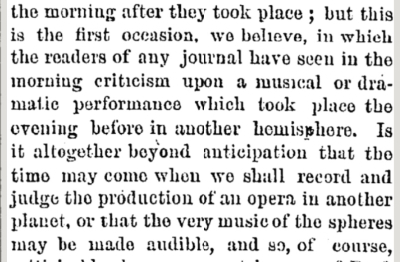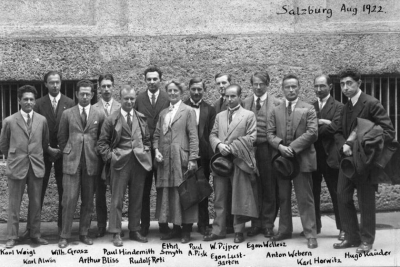Alex Ross's Blog, page 32
May 16, 2023
May 14, 2023
Opera in another planet
An editorial in the New York Times of Aug. 20, 1876, commenting on the paper's overnight reports from Bayreuth.
May 11, 2023
The Louisville Experiment
The Louisville Orchestra and Yo-Yo Ma in Mammoth Cave.
Cave Art. The New Yorker, May 15, 2023.
Like many new-music enthusiasts of a certain age, I once spent long hours with the Louisville Orchestra's epic series of First Edition recordings, which ran from 1955 to 1992 and produced well over 150 albums. WHRB, my college radio station, had a complete run of them, and they gave me a sense of the scope of compositional language in the postwar era. In preparing to write about the modern-day Louisville Orchestra, I revisited many of those discs and enjoyed immersing myself in the mid-century moderate-modern styles that the series tended to favor. A few works that stood out: Henk Badings's Seventh Symphony, Chávez's Fourth Symphony, Villa-Lobos's Erosion, Peggy Glanville-Hicks's The Transposed Heads (the first Thomas Mann opera), Jacques Ibert's "Louisville" Concerto for Orchestra, Darius Milhaud's Kentuckiana, and Luigi Dallapiccola's Variations for Orchestra, which, in my estimation, holds up better than Elliott Carter's congested work of the same title. There's also a fair amount of professional note-spinning, but the aim never was, as it never should be, to search out masterworks and nothing but. In retrospect, it's astonishing how much music both the orchestra and its conductor, Robert Whitney, were able to absorb.
For the fascinating history of the ensemble, I turned to three dissertations: Carole Birkhead's The History of the Orchestra in Louisville (University of Louisville, 1977), Jeanne M. Belfy's The Commissioning Project of the Louisville Orchestra, 1948-1958: A Study of the History and Music (University of Louisville, 1986), and Sandra Lee Fralin's The Role of the Louisville Orchestra in the Fostering of New Music, 1947-1977 (Southern Baptist Theological Seminary, 2000). Belfy's The Louisville Orchestra New Music Project: An American Experiment in the Patronage of International Contemporary Music (University of Louisville Publications in Musicology, 1990) gives a selection of letters from commissioned composers; it was necessary, of course, to provide a reproduction of Lou Harrison's contribution, executed in his marvelous calligraphy. I also learned much from Owsley Brown's heartfelt documentary Music Makes a City, which I mentioned on this blog when it came out, in 2010. Deborah Ishlon's article "More Music Than Anywhere," which appeared in the July/August 1953 issue of High Fidelity, gives precious glimpses of the amazing, Varèse-loving Mayor Charles Farnsley in action. Later, when Farnsley served a term in the U.S. House of Representatives, he read obituaries for Varèse into the Congressional Record.
May 6, 2023
Dame Ethel and the boys
This notable photograph is featured on the cover of Achtung International: Salzburg and 100 Years of the International Society for Contemporary Music, a forthcoming volume edited by Matthew Werley.
May 4, 2023
Only two kinds of music: good and bad
The famous aphorism is most commonly associated with Duke Ellington, who wrote in 1962, "There are simply two kinds of music, good music and the other kind." The saying has also been attributed to Louis Armstrong. In the nineteenth century, the remark was ascribed to Rossini. Edward Wilberforce's 1863 book Social Life in Munich quotes Rossini as follows: "My dear sir, there is no such distinction as you suppose between Italian, French, and German music; there are only two kinds of music, good and bad." But the real source is likely to be the poet and playwright Franz Grillparzer, who wrote in 1856:
Die Kritiker, will sagen: die neuen,
Vergleich ich den Papageien,
Sie haben drei oder vier Worte,
Die wiederholen sie an jedem Orte.
Romantisch, klassisch und modern
Scheint schon ein Urteil diesen Herrn,
Und sie übersehen in stolzem Mut
Die wahren Gattungen: schlecht und gut.
The critics, meaning the new ones,
I compare to parrots,
Who have three or four words
That they repeat in every place.
Romantic, classical, and modern
Seems a judgment to these gentlemen,
And with proud courage they overlook
The real genres: bad and good.
May 3, 2023
Pop elitism, continued
April 30, 2023
A Rubbra moment
Rubbra's Improvisation belongs to the vast library of works commissioned by the Louisville Orchestra from 1948 onward. The fantastic soloist is Sidney Harth, who was concertmaster in Louisville before moving on to Chicago and Los Angeles. Invariably I think also of Sidney's son Robert, who, until his tragically early death in 2004, presided over the greatest period in the modern history of Carnegie Hall. Also worth a listen: Wallingford Riegger's Variations.
April 27, 2023
A Roy Harris moment
This flute-and-quartet piece by Roy Harris, from 1942, is indeed titled 4 Minutes 20 Seconds.
April 25, 2023
For Minnie
Minnie, one of the sweetest, happiest, most innately purr-prone cats ever to roam the planet's living rooms and linen closets, died on Sunday, at age fourteen. Having spent almost her entire life in the company of the remarkable Bea, she seemed heartbroken by Bea's departure last month, and her health declined. But she kept her bright, loving, perpetually kittenish spirit to the end. She joins Bea, Maulina, and Penelope (whom she never met but whose spirit she inherited) in the land of immense, immobile sunbeams.
Previously: Requiem for a great cat.
April 20, 2023
Alex Ross's Blog
- Alex Ross's profile
- 425 followers








